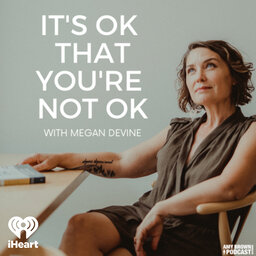The Grief of Getting What You Want: with Chase Jarvis
Have you ever felt something, then immediately “disqualified” yourself from feeling it? As if you don’t have the right to feel what you’re feeling?
Chase Jarvis is a very successful man. He’s also kind, and thoughtful, and actively exploring his own ideas of himself. If you’ve heard Chase speak before, this is a very different kind of conversation.
We make a lot of invisible things visible in this episode, from the creativity of every day, to the grief of getting what you want, to how a near-death experience can both shape your entire life AND be something you refuse to think about.
5 things you’ll learn in this episode (at least 5!)
- The difference between Big C Creativity and little c creativity (and how it relates to hard times)
- How the roles we’re “allowed” to inhabit get fed to us, starting in childhood
- Is there a grief spectrum? If so, where do you land on it?
- Are you allowed to feel grief, when objectively speaking, other people have it a lot worse?
- If someone sobs in your presence, that might be a very good thing.
Content note: this episode contains a lot of swearing.
Notable quotes:
“Am I worthy of becoming the person that I want to become?” - Chase Jarvis
About our guest:
Chase Jarvis is an award-winning artist, entrepreneur, best-selling author, and one of the most influential photographers of the past 20 years. His expansive work ranges from shooting advertising campaigns for companies like Apple, Nike, and Red Bull; to working with athletes like Serena Williams and Tony Hawk, to collaborating with renowned icons like Lady Gaga and Richard Branson. He is the Founder of CreativeLive, where more than 10 million students learn from the world’s top creators and entrepreneurs; CreativeLive was acquired by Fiverr in 2021. His recent book Creative Calling debuted as an instant National Best Seller.
More at chasejarvis.com
About Megan:
Psychotherapist and bestselling author Megan Devine is recognized as one of today’s most insightful and original voices on grief, from life-altering losses to the everyday grief that we don’t call grief. She helms a consulting practice in Los Angeles and serves as an organizational consultant for the healthcare and human resources industries.
The best-selling book on grief in over a decade, Megan’s It’s Ok that You’re Not OK, is a global phenomenon that has been translated into more than 25 languages. Her celebrated animations and explainers have garnered over 75 million views and are used in training programs around the world.
Additional resources:
The long dark night of the soul is commonly understood as a time of spiritual dryness and existential doubt and loneliness. For more on the “long dark night of the soul,” Check the wiki page.
Chase’s book - Creative Calling
Chase references Ram Dass, and the quote, “We’re all just walking each other home.”
Want to talk with Megan directly? Apply for one of her limited 1:1 consultations here, or join our patreon community for live monthly Q&A sessions: either way, it’s your questions, answered.
Check out Megan’s best-selling books - It’s OK That You're Not OK and How to Carry What Can’t Be Fixed
Books and resources may contain affiliate links.
Get in touch:
Thanks for listening to this week’s episode of It’s OK that You’re Not OK. Tune in, subscribe, leave a review, tag us on social with your thoughts, and share the show with everyone you know. Together, we can make things better, even when they can’t be made right.
Follow the show on TikTok @itsokpod and use the hashtag #ItsOkPod on all social platforms.
For grief support & education, follow us at @refugeingrief on Instagram, Facebook, Twitter, and TikTok, and follow Megan on LinkedIn.
For more information, including clinical training and consulting and to share your thoughts, visit us at megandevine.co
 It’s OK That You’re Not OK with Megan Devine
It’s OK That You’re Not OK with Megan Devine


